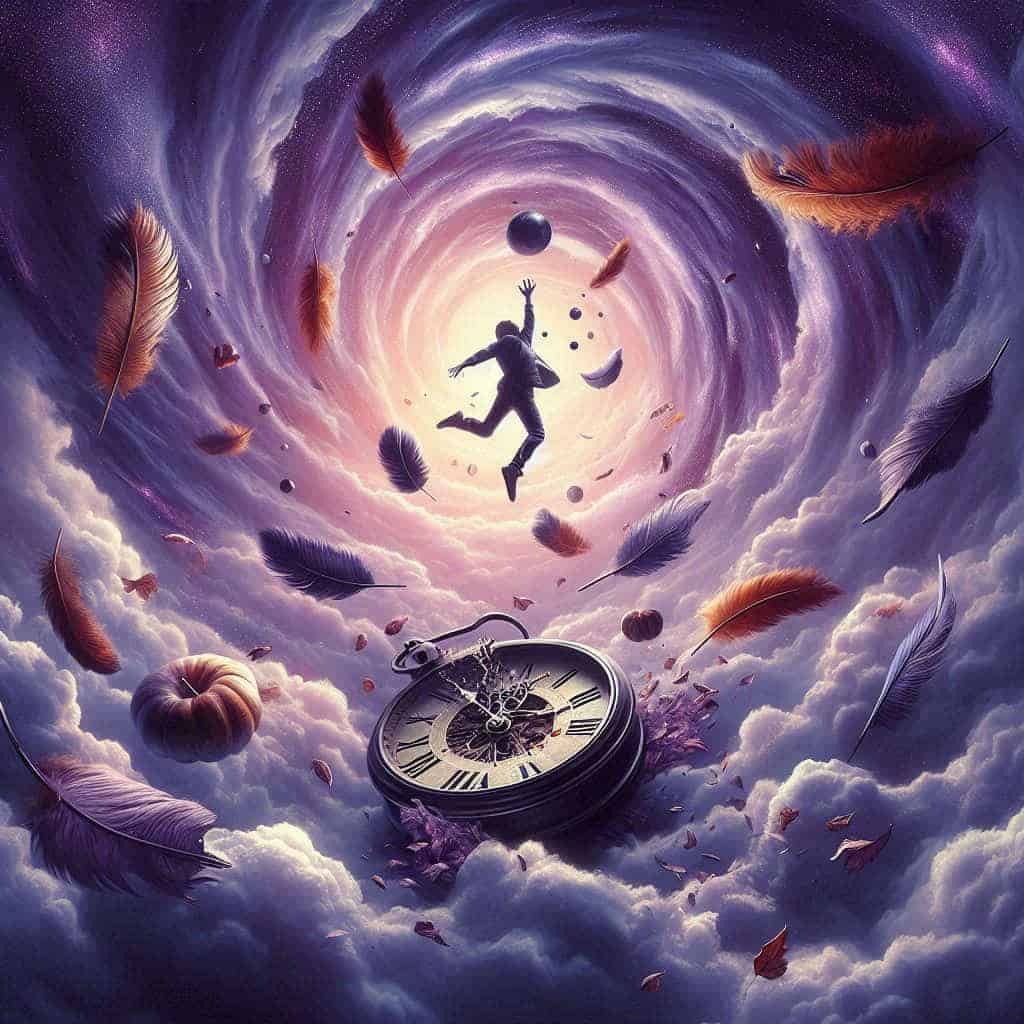The Deep Dive: Exploring the Hidden Messages in Falling Dreams
Falling dreams, with their visceral sensation of plummeting through space, hold a unique fascination for dreamers across cultures and periods. In the vast realm of dream symbolism, these dreams stand out as potent symbols laden with hidden messages and meanings. Understanding the significance of falling in dreams not only provides insights into the workings of the subconscious mind but also offers a pathway to deeper self-awareness.
Dreams have long held a central place in the realms of psychology, spirituality, and cultural mythology. From Sigmund Freud’s pioneering interpretations to Carl Jung’s archetypal theories, scholars and thinkers have sought to unravel the mysteries of the dreaming mind. Falling in dreams, with their ubiquity and intensity, have emerged as a focal point of this exploration.
This article embarks on a journey into the depths of falling in dreams, aiming to shed light on their hidden messages and profound symbolism. Through a blend of psychological insights, cultural perspectives, and personal reflections, we delve into the rich tapestry of meanings woven within the fabric of falling in dreams. Join us as we embark on a deep dive into the enigmatic world of falling in dreams, where every descent holds the promise of illumination and self-discovery.
The Phenomenon of Falling in Dreams
Falling in dreams are a common occurrence in the realm of dreaming, experienced by individuals across diverse demographics and cultures. While the specific content and context of these dreams may vary widely, the sensation of plummeting through space remains a striking and universal feature.
Frequency and Commonality of Falling in Dreams:
Falling dreams are among the most frequently reported types of dreams, with studies indicating that a significant portion of the population experiences them at least occasionally. Research suggests that falling in dreams occurs most commonly during the rapid eye movement (REM) stage of sleep, which is associated with heightened brain activity and vivid dream imagery.
Dream about Variations in Falling Experiences:
Falling in dreams can manifest in a myriad of forms, ranging from subtle sensations of descent to dramatic free falls from great heights. Some individuals may experience recurring falling in dreams with consistent themes or settings, while others may encounter falling scenarios that vary widely from one dream to the next. The diverse nature of falling in dream experiences underscores the complexity of their symbolism and interpretation.
Cultural and Historical Perspectives on Falling in Dreams:
Throughout history, falling in dreams has captured the imagination of artists, writers, and philosophers, reflecting broader cultural attitudes toward concepts such as fate, mortality, and the human condition. In various cultural traditions, falling in dreams has been interpreted as omens, warnings, or symbols of spiritual transformation. Exploring the cultural and historical significance of falling in dreams offers valuable insights into the enduring fascination with these enigmatic nocturnal experiences.
Psychological Interpretations
Falling in dreams has long been the subject of fascination for psychologists, who view them as windows into the unconscious mind and reflections of inner psychological dynamics. Several prominent psychological theories offer insights into the possible meanings and interpretations of falling in dreams.
Freudian Analysis: Descent into the Unconscious:
According to Sigmund Freud, falling in a dream means a sense of loss of control or powerlessness, often rooted in unresolved childhood conflicts or anxieties. Freudian interpretation suggests that falling represents a regression to primal fears and desires, reflecting the individual’s struggle to navigate the complexities of the psyche.
Jungian Perspectives: Symbolism and Archetypes:
Carl Jung proposed that falling in dreams contains archetypal symbols that resonate with universal themes and experiences. From a Jungian perspective, the act of falling may symbolize a journey into the depths of the unconscious, where hidden truths and undiscovered aspects of the self await exploration. Jungian interpretation encourages individuals to examine the symbolism of falling dreams in the context of their personal mythologies and collective unconscious.
Cognitive Theories: Processing Fear and Anxiety through:
Cognitive theories of dreaming suggest that falling in dreams serves a functional purpose in processing and regulating emotions, particularly fear and anxiety. According to this perspective, the sensation of falling may be linked to physiological changes in the body during sleep, such as changes in heart rate or muscle tension. Falling in dreams may provide an opportunity for the mind to rehearse coping strategies for dealing with stressful situations, thereby promoting emotional resilience and adaptation.
Exploring these psychological interpretations offers valuable insights into the multifaceted nature of falling in dreams and their potential significance in understanding the inner workings of the human psyche. By examining the symbolic language of dreams through various psychological lenses, individuals can gain deeper self-awareness and insight into their thoughts, feelings, and behaviors.
Symbolism and Themes

what does it mean when you dream about falling?
Dreaming about falling can symbolize a loss of control, insecurity, or fear of failure in your waking life. It may also suggest a need for support or stability in your current circumstances. Additionally, falling in dreams can represent a sense of vulnerability or being overwhelmed by certain situations. Exploring the symbolism and themes associated with falling in dreams can provide valuable insights into your subconscious thoughts and emotions.
Dreaming about falling may indicate a lack of stability or a feeling of being out of control in your daily life. It could also suggest underlying anxieties or fears of failure. Additionally, this dream could be a reflection of vulnerability or a sense of being overwhelmed by certain circumstances. Understanding the symbolism and themes associated with falling in dreams can provide valuable insights into your subconscious thoughts and emotions.
Falling in dreams are rich in symbolism, reflecting a myriad of themes and motifs that resonate with the subconscious mind. By unpacking the underlying symbolism of falling in dreams, individuals can gain a deeper understanding of the psychological and emotional messages encoded within these nocturnal experiences.
Loss of Control and Powerlessness:
One prominent theme in falling dreams is the sensation of losing control or powerlessness. The act of falling may symbolize feelings of vulnerability or helplessness in waking life, whether stemming from interpersonal conflicts, professional challenges, or existential uncertainties. Falling in dreams may serve as a symbolic expression of the individual’s struggle to regain a sense of agency and autonomy amidst life’s uncertainties.
Fear of Failure and Insecurity:
Falling in dreams often evoke feelings of fear, anxiety, or insecurity, reflecting the individual’s apprehensions about failure or inadequacy. The sensation of plummeting into the unknown may mirror the individual’s fear of making mistakes, taking risks, or facing rejection. By confronting these fears within the safe confines of the dream world, individuals may gain insights into their underlying insecurities and develop strategies for overcoming self-doubt.
Desire for Freedom and Liberation:
Despite their associations with fear and anxiety, falling in dreams can also symbolize a yearning for freedom and liberation. The sensation of falling may evoke a sense of exhilaration or liberation, as the individual experiences a temporary release from the constraints of everyday life. Falling in dreams may serve as a metaphorical reminder of the individual’s innate desire for exploration, adventure, and self-discovery.
Surrender and Acceptance in the Face of Adversity:
Alternatively, falling in dreams may convey themes of surrender and acceptance in the face of adversity. Rather than resisting the descent, the dreamer may choose to surrender to the experience, embracing the uncertainty and relinquishing control. Falling in dreams may symbolize a willingness to confront life’s challenges with courage and resilience, trusting in the eventual emergence of new opportunities and possibilities.
Personal Reflections and Interpretations
While falling in dreams may share common themes and symbolism, their significance can vary greatly from one individual to another. Personal reflections and interpretations play a crucial role in uncovering the deeper meanings embedded within these nocturnal experiences.
Case Studies and Anecdotes Illustrating Individual Experiences:
Examining real-life case studies and personal anecdotes offers valuable insights into the diverse ways in which falling in dreams manifests and is interpreted by individuals. By sharing stories of falling in dream experiences, individuals can gain perspective on the unique contexts and circumstances that shape their dreams and the emotions they evoke.
Exploration of Recurring Falling in Dream Motifs and Their Meanings:
For individuals who experience recurring falling in dreams, identifying and exploring common motifs can provide clues to their underlying significance. Whether it’s a specific location, scenario, or emotional response associated with the falling-in dream, delving into these recurring themes can shed light on unresolved issues or recurring patterns in the individual’s waking life.
Techniques for Interpreting and Understanding One’s Own Falling Dreams:
Developing techniques for interpreting and understanding one’s own falling in dreams can empower individuals to engage more deeply with their subconscious mind. Keeping a dream journal, practicing mindfulness techniques, or engaging in guided dreamwork exercises can help individuals uncover the hidden messages and symbolism within their falling in dreams. By honing these interpretive skills, individuals can gain greater insight into their innermost thoughts, feelings, and desires.
By embracing personal reflections and interpretations, individuals can tap into the rich reservoir of wisdom and insight that lies within their own subconscious mind. Through self-exploration and introspection, individuals can unlock the transformative power of falling in dreams, gaining deeper self-awareness and understanding in the process.
Cultural and Mythological Significance
Falling dreams have captured the imagination of humanity throughout history, permeating cultural myths, legends, and spiritual beliefs. Exploring the cultural and mythological significance of falling in dreams offers a glimpse into the diverse interpretations and symbolic associations that have shaped human understanding of these nocturnal phenomena.
Mythological Tales Featuring Falling Motifs:
Across cultures and civilizations, mythological tales abound with narratives featuring falling motifs. From ancient myths of Icarus plummeting from the sky to the biblical story of Adam and Eve’s expulsion from paradise, falling serves as a potent symbol of transformation, redemption, and mortality. These myths offer timeless insights into the human condition and the existential challenges we face on our journey through life.
Cultural Interpretations and Superstitions Surrounding Falling in Dreams:
In many cultures, falling in dreams are imbued with a variety of interpretations and superstitions. Some view falling in dreams as omens of impending danger or misfortune, while others see them as messages from the spirit world or divine realm. Cultural attitudes towards falling in dreams may reflect broader beliefs about fate, destiny, and the interconnectedness of the spiritual and material worlds.
Contemporary Cultural References and Representations of Falling Dreams in Media:
In contemporary culture, falling in dreams continues to hold sway over popular imagination, inspiring works of literature, art, and film. From surrealist paintings depicting surreal landscapes to blockbuster movies featuring dream sequences of characters falling through endless abysses, falling in dreams serve as a powerful metaphor for the human experience of uncertainty, vulnerability, and existential angst.
By examining the cultural and mythological significance of falling in dreams, individuals can gain a deeper appreciation for the universal themes and archetypal symbols that underlie these enigmatic nocturnal experiences. From ancient myths to modern-day interpretations, falling in dreams offers a rich tapestry of meanings that transcend time and culture, inviting us to explore the depths of our collective unconscious and the mysteries of the human psyche.
Practical Applications and Coping Strategies
Understanding the symbolism of falling in dreams not only provides insights into the workings of the subconscious mind but also offers practical applications and coping strategies for navigating the challenges of waking life. By harnessing the wisdom embedded within falling in dreams, individuals can develop resilience, self-awareness, and emotional well-being.
Utilizing Falling in Dream Insights for Personal Growth and Self-Awareness:
By reflecting on the themes and symbolism of falling dreams, individuals can gain valuable insights into their innermost thoughts, feelings, and desires. Exploring the deeper meanings encoded within falling in dreams can facilitate personal growth and self-awareness, empowering individuals to confront and overcome obstacles in their waking lives.
Coping Mechanisms for Addressing Fear and Anxiety Triggered by Falling Dreams:
Falling in dreams often evoke feelings of fear, anxiety, or insecurity, reflecting the individual’s apprehensions about failure or inadequacy. Developing coping mechanisms for addressing these emotions can help individuals navigate the emotional challenges triggered by falling in dreams. Techniques such as relaxation exercises, mindfulness meditation, and cognitive-behavioral therapy can help individuals manage anxiety and cultivate a sense of inner peace and resilience.
Incorporating Mindfulness and Dream Journaling into a Holistic Approach to Dream Interpretation:
Incorporating mindfulness practices and dream journaling into a holistic approach to dream interpretation can deepen one’s understanding of falling into dreams and their significance. By cultivating mindfulness, individuals can cultivate a deeper connection with their dreams, enabling them to observe their thoughts, feelings, and sensations with curiosity and compassion. Dream journaling provides a tangible record of falling in dreams, allowing individuals to track recurring themes and patterns over time and gain insights into their psychological and emotional landscapes.
By integrating these practical applications and coping strategies into their lives, individuals can harness the transformative power of falling dreams to foster personal growth, self-awareness, and emotional resilience. Rather than viewing falling dreams as mere nocturnal occurrences, individuals can embrace them as opportunities for introspection, exploration, and healing.
Conclusion
In the vast realm of dream symbolism, falling in dreams stands out as a potent metaphor for the human experience of uncertainty, vulnerability, and transformation. Through a multifaceted exploration of falling dream symbolism, we have delved into the depths of the subconscious mind, uncovering hidden messages and profound insights encoded within these enigmatic nocturnal experiences.
From psychological interpretations to cultural and mythological perspectives, falling dreams offer a rich tapestry of meanings that resonate with the collective unconscious and the universal human condition. By embracing the symbolism of falling in dreams, individuals can gain deeper self-awareness, insight, and understanding, empowering them to navigate the complexities of waking life with courage, resilience, and grace.
As we conclude our exploration of falling in dreams, let us remember that the journey into the subconscious is an ongoing process of discovery and self-exploration. By engaging with our dreams with curiosity, openness, and compassion, we can unlock the transformative power of the dreaming mind, embracing the mysteries of the psyche and the boundless potential for growth and healing that lie within.







